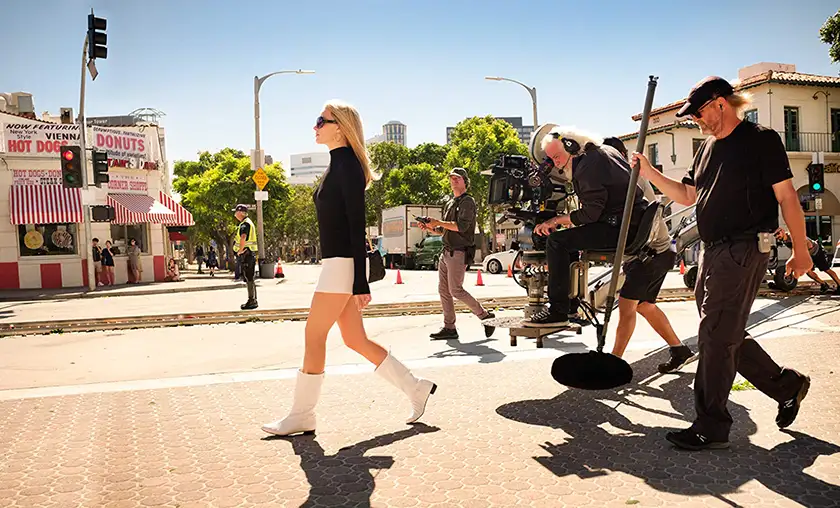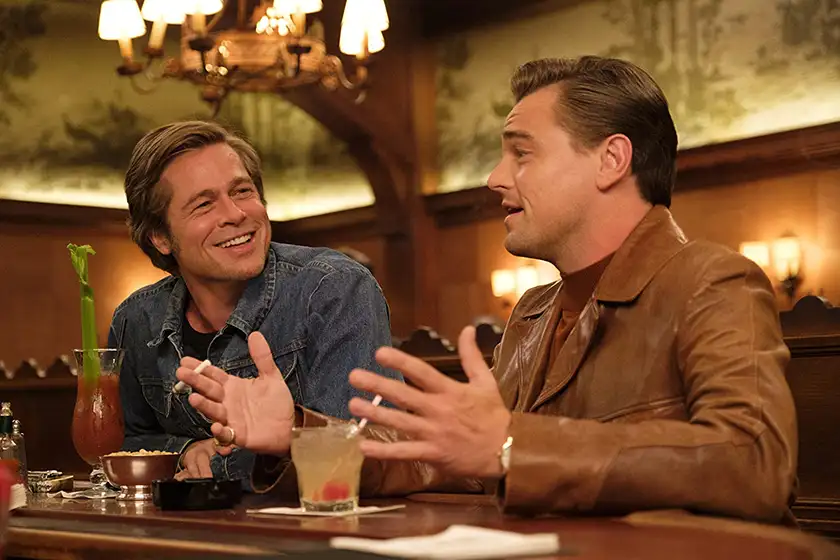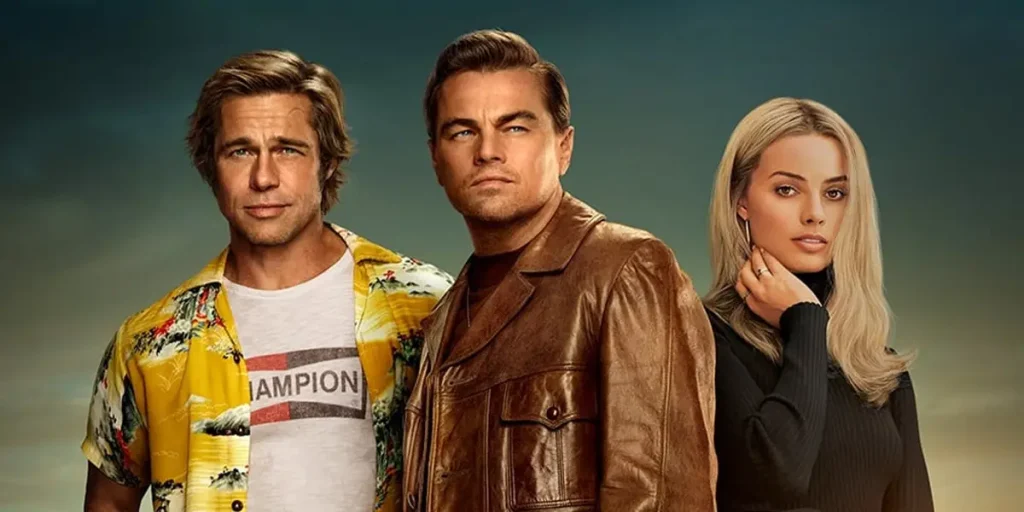Once Upon a Time in Hollywood is pure Tarantino. Fun, suspense and unexpected affection in a passionate ode to cinema in its many shapes and forms.
“It’s good, but it’s not Tarantino’s best movie”.
It’s not my opinion of Once Upon a Time in Hollywood. It’s obviously not a quote from the film either, nor is it a statement I overheard at the press conference.
It’s the ironic comment a friend of mine jokingly made a few years ago, when Inglorious Basterds first came out. We were talking about those journalists and cinephiles who watch a new Tarantino film and promptly declare themselves happy, but not fully satisfied. Because, though it certainly was a good Tarantino movie, it was not “Tarantino’s Best Film to Date”.
As I was watching Once Upon a Time In Hollywood, between one surge of joy and the other, I often found myself thinking back at that joke. For the first time, I started wondering whether or not what I was watching could turn out to be Tarantino’s “Best” film to date. I’m talking about the Tarantino with a capital T, the one who, “after Pulp Fiction, they broke the mould”. But it’s not because I didn’t like the movie, but because I felt that not everyone was likely to love it, and that many would either not appreciate it or not understand it, and this made me strangely sad.
Once Upon a Time In Hollywood is not the peak of Tarantino’s directorial career, but it is, without a doubt, its crowning glory. It’s an ode to cinema, with all its infinite layers.
It’s a movie that talks about cinema, is set in the city of cinema, with leading characters who work in the industry. Cinema is everywhere: it’s in the bright, excessive neon signs that light up the city every night, it’s in the posters that cover it and it’s in the “parade” of movie theaters advertising their new releases and displaying names of legendary actors and actresses in plain view.
In 1969 Hollywood, everything was cinema to Tarantino. The director dives headfirst and tells us a story that celebrates that very same cinema he loves so much in a way that is so intimate, natural and… cinephile that it could catch less experienced viewers off guard. Because, needless to say, there’s an abundance of references, to the point that even enthusiasts might not be able to recognise them all. Once Upon a Time In Hollywood is a whirlwind of faces coming back from the past and titles you won’t remember having heard before (assuming you had even heard them before!) until you notice them outside a cinema or hear them mentioned by one of the characters. The director’s fans will enjoy themselves as they attempt to identify the film’s many self-references (including one from Inglorious Basterds), and their involvement in the story will constantly increase throughout the movie.

There’s talk of cinema and there are those who “live” cinema, both inside and outside the theatre. A theatre where a carefree Sharon Tate (Margot Robbie) goes to watch herself in The Wrecking Crew, the very same film through which she “made herself known” and that enabled Tarantino to appreciate her as a comic actress – “I liked the fact that this very pretty girl wasn’t afraid to make a fool of herself: she was such a natural for this role”. When she sees herself on the screen and witnesses the audience react to her performance, her enthusiasm is contagious and reminds us of what every single person who loves cinema feels, after all, when entering the screening room or watching a film they particularly enjoyed.
Sharon passes by the movie theater almost by chance. She stops, she walks on by, she changes her mind. She timidly walks in and looks at the set photos and posters hanging outside, portraying her in different scenes. She skims over the names of the cast members and director she worked with. She smiles and decides to go in, asking if she can do it free of charge, “I’m in the film!”. Tarantino is not just telling us about cinema: he is also teaching us how to approach it as an audience. He is teaching us how to savour it and he is giving us time to observe every single detail and learn as much as we can.
During the press conference, Leonardo DiCaprio stressed that, to him, working with Tarantino is first and foremost a chance to learn, to “study” cinema. “Quentin’s films are an opportunity to discover unknown authors and works that you can then study in more depth on your own”.
Once Upon a Time In Hollywood is pure emotion for all those who are not only passionate about cinema, but also enjoy it. It exudes that childlike energy that is typical of those who can stand up to adversities and… go back to the screening room!, looking for new escapes and emotions.
Once Upon a Time In Hollywood is not only about cinema, though. Because there’s an unusual tenderness in Rick Dalton (Leonardo Di Caprio) and Cliff Booth (Brad Pitt), our two protagonists who live wildly and on the edge.
Rick is a washed-up actor, the star of a failed western TV show who now lives of alcohol and regrets. Indisputably talented but condemned to play the role of the saloon bidimensional villain, he works as a body double for all those actors who have been stuck in a role only to be inevitably forgotten. Devoured by this “dream factory” that never stops and hardly ever gives second chances. Always and forever by his side there’s Cliff, a stuntman who is persecuted by an “obscure” past that is never revealed. He is unable to find work, so he ends up doing all sorts of tasks for Rick, from becoming his driver to fixing his TV’s aerial. But if DiCaprio delivers at least a couple of captivating close-up monologues, which he handles masterfully, it’s Pitt’s ambiguous character that inexorably draws the audience’s attention.

As a backdrop to the “odd couple”‘s misadventures, we find the stunning Sharon Tate and her husband, director Roman Polanski (Rafal Zawierucha), Rick’s young, carefree, smiling neo-neighbours who are, in turn, observed by a group of disquieting hippies who settled down in the (more or less) adjacent Spahn Ranch.
Friendship is Once Upon a Time in Hollywood ‘s other great engine – that is, the foundation that enables people to understand and respect each other. Friendship is talked about and experienced in many shapes, like the bond shared between Rick and Cliff, inseparable “brothers” who are still there for one another “no matter what” despite the thousand adversities they faced. Friends are made out of relationships that have come to an end, like Jay Sabring (Emile Hirsch), who is still in love with Sharon but can put his own happiness aside for her and become both friend and irreplaceable support for the couple. There are deep-rooted friendships and there are friendships that are just starting to bloom, but are still simple and genuine.
There’s a threat impending upon each and everyone of them, and that is represented by a nearly evanescent Charles “Charlie” Manson (his appearences in the film are extremely rare) and his followers, who are loaded with all the alarming insolence and recklessness (and foolishness) of youth, that spreads like a shiver under the skin. Reinforced by the audience’s historical knowledge, but also by the awareness that, with Tarantino, nothing is ever certain, this threat creates what is perhaps one of the longest suspense sequences in the history of cinema. A special mention goes to the incredibly beautiful extended shot that introduces Manson’s group’s “lair” to us, which is worthy of the best western movies and also has great significance as a “wormhole” between genres.
In retrospect, Once Upon a Time in Hollywood is disarmingly honest both in its stories and characters and behind the camera, as Tarantino revels in making us distrust them. He plants doubt in our minds with strategic shots, sequences that sometimes seem to last forever and seemingly casual sentences, like the great Cumaean Sibyl he is, building up tension and making the audience wonder about what kind of film this really is.
Once again, the director presents us with a work that is difficult, if not impossible, to place. A comedy, a western, a thriller… Once Upon a Time in Hollywood is all this and so much more. As usual, it’s a way for Tarantino to offer us a part of himself, of his experience and, most of all, of his passion. He does it by narrating in his own way what might just be the most intimate story out of everything he’s brought to the big screen so far. “To many directors this is a profession, but, to him, it’s passion”, producer David Heyman declared, and we couldn’t agree more.
Once Upon a Time in Hollywood is not “Tarantino’s Best Film to Date”, it’s Tarantino himself. In all of its resounding and elaborate simplicity.
Once Upon a Time in Hollywood is now available to watch on digital and on demand, and on DVD and Blu-Ray. Read our review of Once Upon a Time in Hollywood in Italian!

